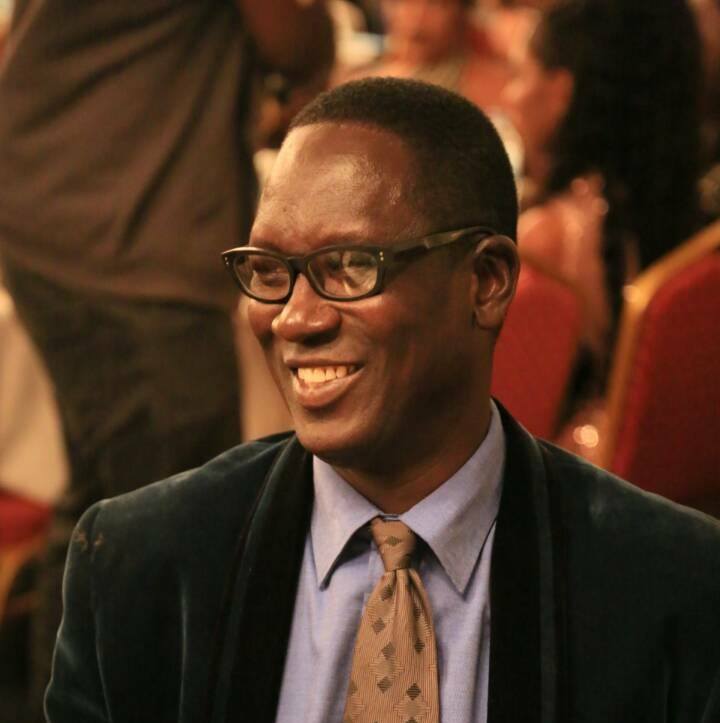 by Alagi Yorro Jallow.
by Alagi Yorro Jallow.Legendary Gambian journalist Ebou Waggeh has died after s brief illness. Ebou, 63, was remembered as a newspaperman, Filmmaker, mentor to so many Gambian journalists following the word of his death. He worked for several newspapers and broadcasting stations in the Gambia media for over 40 years, including the New Citizen newspapers, Citizen FM radio and the Gambia Radio and Television Services ( GRTS), and founding executive member of the Gambia Press Union also editor of the defunct Gambia Cooperative Magazine.
Ebou Waggeh was a pioneering journalist known for his work in the mainstream Gambian media and editor also a Filmmaker. He was widely honored: Ebou was a legend of political journalism, and he was honored with awards and other recognition from many sources. A significant loss for all of us. He was vibrant and generous and believed in good. I will dearly miss Ebou Waggeh terribly. His kindness, generosity, sharp intellect, and thoughtful take on the day’s significant issues made independent journalism a better place, and all of us better journalists: my brother and friend, my colleague, my hero. Ebou has died. Brilliant. Brave. Kind. Hilarious. A fierce patriot.
Moreover, one of the best human beings I have ever known. He was a true pioneer of the business and a revered colleague. Full of integrity and utterly charming. He has done it all but carried it lightly. Always curious, asking questions. One of the great privileges of getting to work with him.
Ebou Waggeh was one of the country’s last great crusading editors and links to journalism’s days of chattering typewriters and smoked-filled, both challenging and sentimental related to the underdog and mingled with the elite. Well-read, well-rounded, and very well connected, Ebou Waggeh was at ease quoting poetry, Ernest Hemingway, Charles Dickens, Wole Soyinka, Chinua Achebe, and William Shakespeare. His topics ranged from politics, sociology, economic journalism, and international relations. However, he would always look back to Banjul he grew up in, a pre-digital age best remembered through the dreamscape of black and white photography Banjul, and there were more daily papers than you could count on one hand.
Ebou wrote in his 1999 editorial in the New Citizen editorial, “Banjul: My Banjul .” “Banjul is a city of daily irritations, occasional horrors, hourly tests of will and even courage, and huge dollops of pure beauty.”
Mortality has a way of confounding living souls. A sound journalist’s mind has shuffled off the mortal coil. Doyen and a veteran journalist have departed the realm of the living, and with that, the flag of his memory is hoisted. For his role in the Committee of Experts, he did a good job. Go well, Comrade Ebou Waggeh.
The earth is better because you once breathed its air. We might pine that the struggle against injustice is one-man short, but we believe that your blood, like rain on parched land, shall water and revive our resolve to change this nation. For sure, you fought a great battle better than many Gambians. In your brief time here, you upheld free press, justice, and the rule of law even to the least deserving of it – Till we meet again.
The media fraternity mourns the loss of a legendary journalist and writer, Ebou Waggeh, who passed away this morning at about 63. Ebou Waggeh was an inspiration to generations of reporters who reveled in his unique storytelling style and his gifts as a writer and reporter who spoke truth to power. As an editor, he was a select few whose opinions were highly anticipated by the public as events unfolded and daily newspapers were delivered. Government officials, too, awaited his take on a news story, sometimes in order to formulate policy. He was one of us, and he made us proud. I offer my profound condolences to Ebou Waggeh’s family, the Gambia Press Union, and friends and to all those who will miss his enormous talent. May Allah grant him the highest Aljannah Firdausi.
 by Alagi Yorro Jallow.
by Alagi Yorro Jallow.
 by Alagi Yorro Jallow.
by Alagi Yorro Jallow.
 by Alagi Yorro Jallow.
by Alagi Yorro Jallow.
Ma sha Allah great and thanks for sharing